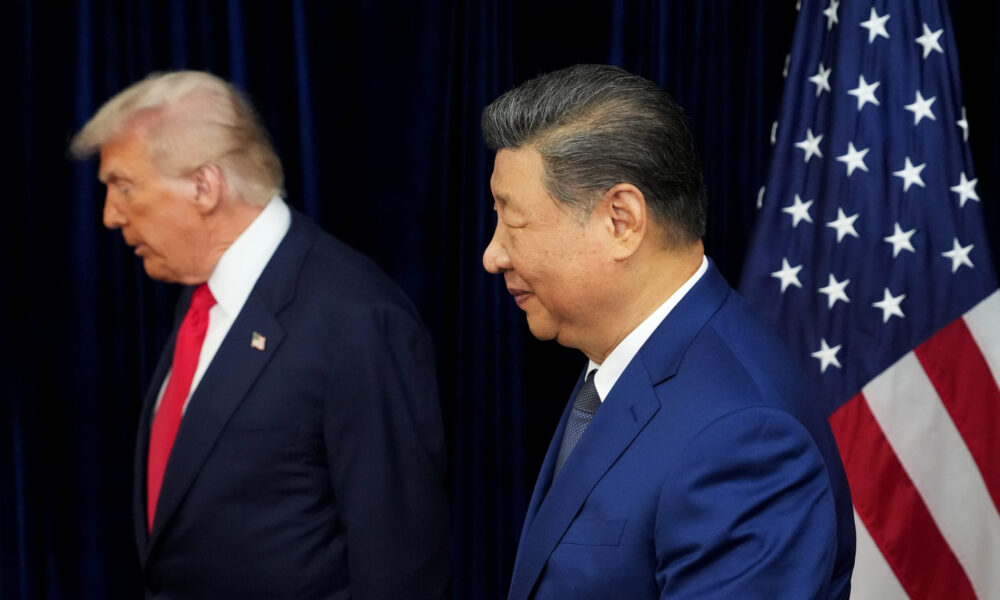During this week’s trip to East Asia, just before his meeting with Chinese President Xi Jinping, US President Donald Trump announced that the United States would resume nuclear weapons testing. It’s unclear whether he was referring to explosive nuclear testing, but if he was, and Xi follows his lead, US nuclear war planners may come to regret it.
Prior to 1996, when China, Russia, and the United States agreed to stop explosive testing, the United States had conducted 1,030 nuclear tests. The Russians came in second with 715 and China lagged far behind the two nuclear superpowers with a meager 45. Done properly, each test offers an opportunity for weapons designers to learn more about nuclear explosions. The more data they collect, the greater the potential to develop new types of nuclear warheads.
China was the last of the three to stop. Its weapons designers needed more time to finish a series of explosive tests that helped them perfect the design of a smaller, lighter nuclear warhead. The ones they had were too large and heavy to fit on the road-mobile intercontinental ballistic missile (ICBM) that became, and remains, the backbone of China’s comparatively small nuclear force.
In 2002, during the first of many visits to the Institute of Applied Physics and Computational Mathematics in Beijing, I had the privilege of listening to an impassioned talk by a Chinese scientist who played a key role in China’s nuclear weapons testing program. The Institute is part of the Chinese Academy of Engineering Physics, which developed and tested China’s nuclear warheads and continues to insure their reliability. He told his colleagues that the negotiation of the Comprehensive Nuclear Test Ban Treaty was not, as some US and Russian advocates argued, motivated by moral or environmental considerations. He argued that the two nuclear superpowers wanted to stop explosive nuclear testing to lock in their significant advantage over China.
There is a law of diminishing returns from explosive nuclear testing. The more tests you conduct, the less useful information you get from each successive test. The US and Russian testing programs have produced enough data about nuclear explosions that their weapons designers may not learn much from another test. China’s data set is much smaller, so Chinese weapons designers would, at least theoretically, have much more to gain from a resumption of explosive testing than their US and Russian counterparts.
It’s odd, therefore, that Trump would make a vague statement on resuming nuclear testing just before meeting with his Chinese counterpart. There is a strong possibility that Xi’s advisors walked away talking more about the implied threat in Trump’s announcement than the important trade issues the two leaders discussed in Busan, South Korea. It’s also likely that sometime in the next few days Xi will receive a briefing from his nuclear weapons laboratories that will almost certainly contain an assessment of what China stands to gain if the existing taboo on explosive nuclear testing is broken by the United States.
Costs that far outweigh the benefits
Our hope is that China’s nuclear weapons experts will tell President Xi the same thing we hope US experts will tell President Trump: that the costs of resuming explosive nuclear testing far outweigh any imagined benefits. Both countries have the ability to conduct experiments that help maintain the reliability of their respective nuclear arsenals without having to detonate a warhead. It is possible their respective capabilities are now advanced enough to develop reliable new warhead designs without explosive testing.
The most painful costs of nuclear testing are the potential consequences for human beings. Atmospheric nuclear testing harmed large numbers of people in all three countries, and the victims are still fighting for recognition and compensation from their governments. A renewal of testing before past harms are addressed would be a politically problematic reminder of past neglect.
Although any new explosive tests would probably be underground, they still pose some risks to people and the environment. While underground tests are designed to limit radioactive fallout and surface effects, containment methods are not foolproof and more likely to fail if preparations are rushed. Containment breaches have harmed site workers, and even small leaks can contaminate groundwater and ecosystems, posing possible long-term exposure and health risks.
The geopolitical costs could be catastrophic. The disruptive impact of renewed nuclear testing could cause irreparable damage to already fragile international mechanisms to control the spread of nuclear arms. If the nuclear superpowers ignore their arms control obligations, some states that agreed not to develop nuclear weapons, like South Korea, may change their mind. Trump’s decision to make his comment on nuclear testing in Busan, while simultaneously green-lighting a South Korean proposal to build nuclear-powered submarines, may reignite recent South Korean debates about developing nuclear weapons.
Some common sense is needed at this moment
If the nuclear-armed members of the UN Security Council don’t honor their nuclear promises, why should any other state? It is difficult to imagine where the unconstrained development of nuclear weapons by more nations may lead, but it is easy to see it will make the world less stable and increase the risk of a nuclear war. That is not a development that China’s leaders, who believe geopolitical stability supports China’s economic development, would like to see.
Another hope—one we share with our Chinese colleagues—is that after his upcoming briefing on testing from China’s nuclear weapons scientists, President Xi will conclude that even if President Trump rushes to conduct a nuclear test, it is in China’s best interest to forgo the technical advantage it could give China’s weapons designers if they were to follow suit.

